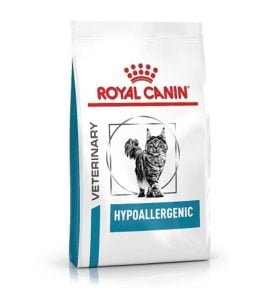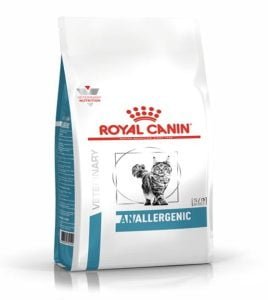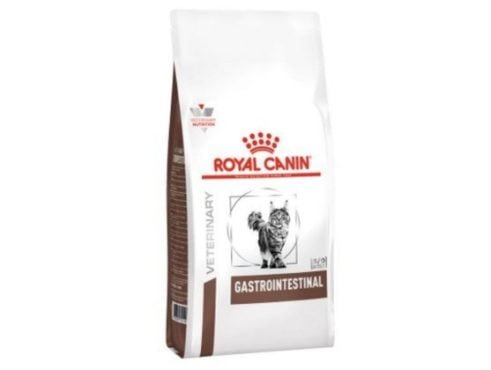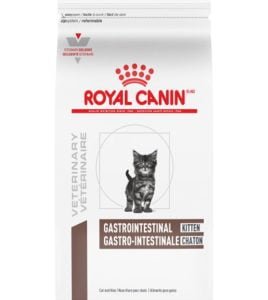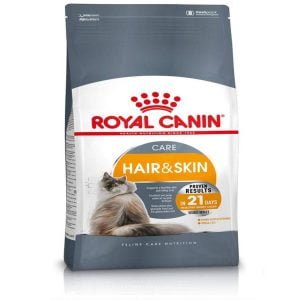- Dry Cat Food
- Reflex Cat Food
- Nourvet Cat Food
- Fluffy Cat Food
- Royal Canin Cat Food
- Champion Premium Cat Food
- Mr. Pet Cat Food
- Diamond Cat Food
- Bonacibo Cat Food
- Happy Cat Food
- Josera Cat Food
- Mito Cat Food
- Micho Cat Food
- Bonnie Cat Food
- Meow Mix Cat Food
- North Paw Cat Food
- Mera Cat Food
- Pawfect Cat Food
- LoveaBowl Cat Food
- Moggy Cat Food
- NutraGold Cat Food
- Pai Pai Cat Food
- Pet Nosh Cat Food
- Proline Cat Food
- Taste of The Wild Cat Food
- Petso Cat Food
- ProSeries Cat Food
- Reflex Plus Cat Food
- Wet Cat Food
- Cat Veterinary Food
- Cat Milk Replacer
- Cat Treats
Cat Food For Allergies: Top 5 Foods in Pakistan
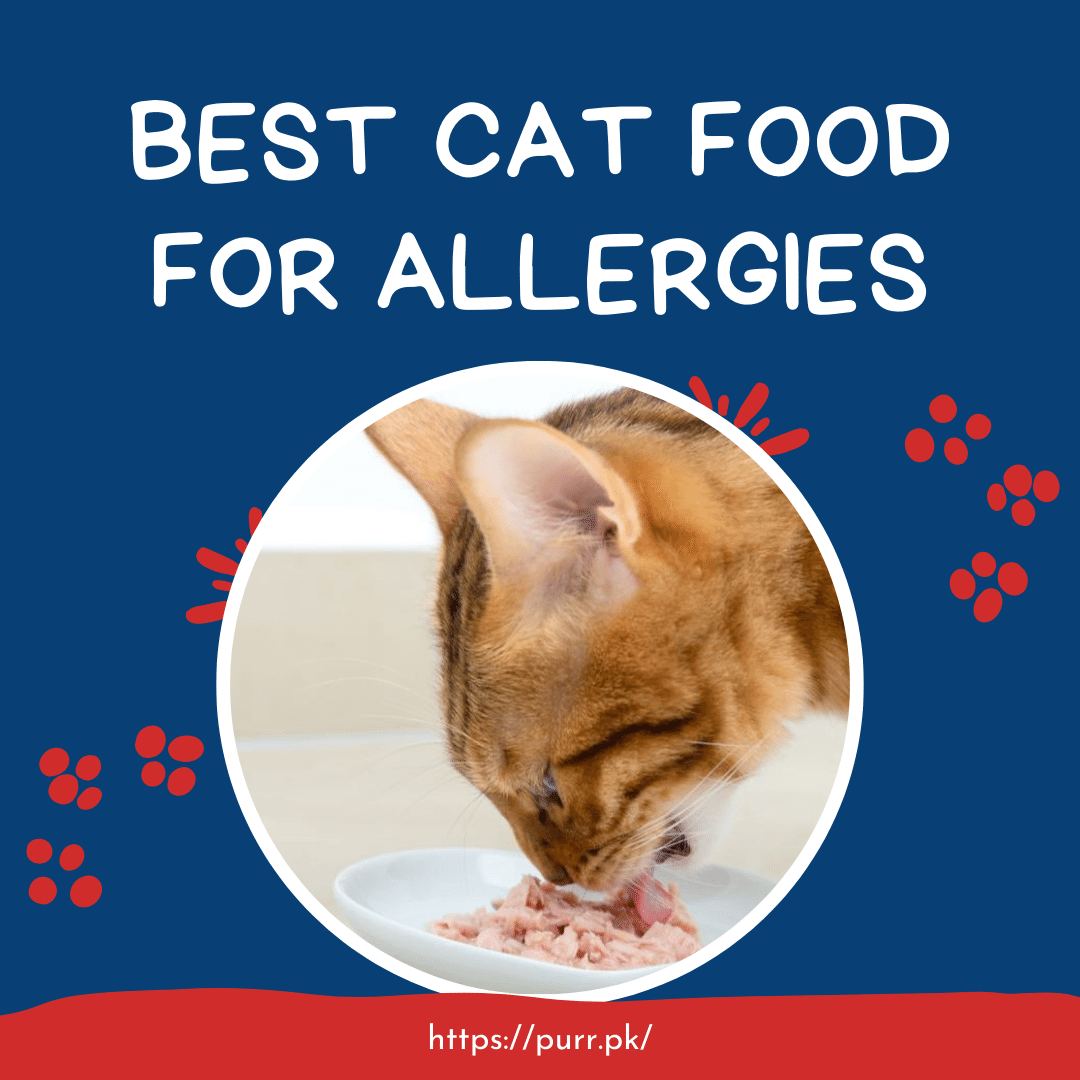
Cats suffering from allergies may need special food to avoid allergens that trigger their symptoms, such as itching, digestive issues, or respiratory problems. These specialized diets are formulated to exclude common allergens like certain proteins or grains. They often contain novel or hydrolyzed proteins that the cat’s immune system doesn’t recognize as allergens. This helps manage allergic reactions and improve the cat’s overall health and comfort.
This guide reviews the 5 best cat foods for your feline buddies suffering from allergies. These foods have been carefully selected and reviewed. However, it is better to consult a vet before switching your cat to a specialized diet.
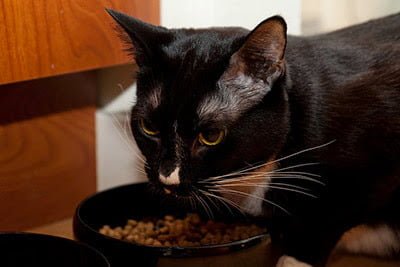
Important: Please note that some of the foods reviewed below may not be available in Pakistan due to import restrictions.
Best Cat Food For Allergies In Pakistan
Royal Canin Hypoallergenic Cat Food
Royal Canin Hypoallergenic Cat Food is specifically crafted to address the needs of cats with Adverse Food Reactions (AFR), leveraging a unique blend of hydrolyzed proteins and essential fatty acids. This formula is designed to reduce the risk of allergic reactions by breaking down proteins into smaller, more digestible fragments, with rice serving as the primary carbohydrate source, gentle on the digestive system.
It also includes EPA/DHA and specific nutrients to support digestive health and reinforce the skin’s natural barrier. While primarily recommended for adult cats, especially those with food sensitivities, it’s not suited for kittens or pregnant or lactating cats. The food supports balanced digestive flora and promotes optimal stool quality, all while being complete and balanced for long-term feeding under veterinary supervision.
Royal Canin Anallergenic Cat Food
Royal Canin Anallergenic Cat Food is specially formulated to address severe adverse food reactions in adult cats. Incorporating a unique blend of hydrolyzed proteins has shown positive outcomes for cats with various sensitivities, including dermatitis and gastrointestinal issues. This specialized diet has effectively resolved digestive problems and improved coat health for many cats, as reported by pet owners. The food is well-received by felines, even those with fussy appetites, indicating its palatability and health benefits.
Royal Canin Gastrointestinal Adult Cat Food
Royal Canin Gastrointestinal Adult Cat Food is a specially formulated diet that supports cats with digestive sensitivities. It includes high-quality protein sources for muscle maintenance, easily digestible carbohydrates for energy, omega-3 fatty acids to reduce inflammation in the gastrointestinal tract, and prebiotics to promote a healthy gut microbiome. This diet is also noted to be free from common allergens that could exacerbate digestive issues in sensitive cats.
Royal Canin Gastrointestinal Kitten Food
Royal Canin Gastrointestinal Kitten Food is designed specifically for kittens with digestive sensitivities, providing a blend of nutrients tailored to support their growth and digestive health. This veterinary-exclusive diet includes highly digestible proteins, balanced fibers including prebiotics, and omega-3 fatty acids like EPA and DHA to support digestive health and the kitten’s natural defenses. It also features a high-energy formula to meet the needs of growing kittens, with nutrients like protein and calcium appropriately balanced. The kibble can be easily rehydrated to help transition kittens from milk to solid food, making it suitable for kittens with decreased appetites or those in the process of weaning.
Royal Canin Hair and Skin Care Dry Cat Food
Royal Canin Hair & Skin Care Dry Cat Food is specially formulated to support cats with dry skin and coats, aiming to improve overall skin health and promote a shiny, soft coat. This diet is enriched with vitamins and omega-3 & omega-6 fatty acids, essential for maintaining healthy skin and coat. The food contains high-quality proteins and a specific blend of nutrients, including B-vitamins, to nourish the skin and reinforce its role as a protective barrier. These components help support healthy hair growth and prevent common issues like dandruff and dull coats.
Things to Consider Before Buying a Cat Food for Allergies
Identify Allergens
It’s crucial to identify the specific allergens affecting your cat. Common allergens include certain proteins (like beef or chicken), grains, and dairy. A veterinarian can help determine these through elimination diets or tests.
Choose Limited Ingredient Diets (LID)
LID cat foods are formulated with fewer ingredients, reducing the risk of triggering allergic reactions. These diets focus on novel protein sources and simple carbohydrates, making it easier to pinpoint and avoid allergens.
Look for Hydrolyzed Proteins
Foods with hydrolyzed proteins break down proteins into smaller particles, making them less likely to trigger an immune response. This can be particularly beneficial for cats with severe allergies or sensitivities.
Check for Additives and Fillers
Avoid foods with unnecessary additives, fillers, or artificial preservatives, which can exacerbate allergies. Opt for natural ingredients with added vitamins and minerals for nutritional balance.
Consult with a Veterinarian
Before changing your cat’s diet, consult with a veterinarian. They can recommend specific types of hypoallergenic food that suit your cat’s unique dietary needs and monitor their response to the new diet.
Consider Omega Fatty Acids
Foods enriched with omega-3 and omega-6 fatty acids can help improve skin health and reduce inflammation, which is beneficial for cats with skin allergies or sensitivities.
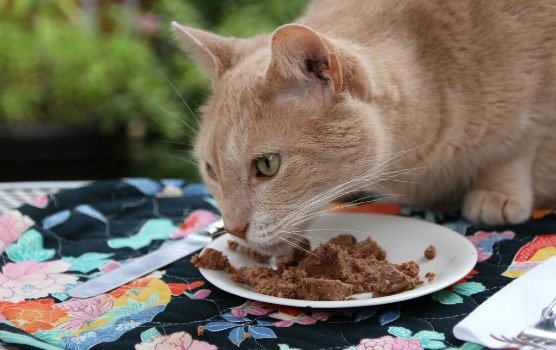
Frequently Asked Questions
What are the common allergies in cats?
Common allergies in cats include reactions to fleas, food ingredients (such as specific proteins), environmental allergens (like pollen, dust mites, and molds), and contact allergies from materials or substances in their environment. Each type of allergy manifests with different symptoms but often includes skin irritation and digestive issues.
How to tell if your cat has allergies?
Symptoms of allergies in cats can include persistent scratching, licking, or grooming; skin irritation or inflammation; hair loss; sneezing, coughing, or wheezing; and gastrointestinal issues such as vomiting or diarrhea. If your cat exhibits these signs, it’s essential to consult a veterinarian for a proper diagnosis and treatment plan.
How do you transition your cat to a cat food for allergies?
To transition your cat to a hypoallergenic diet, gradually mix the new food with their current food over 7-10 days, increasing the proportion of the new food daily. This gradual change helps prevent gastrointestinal upset and allows you to monitor your cat for any adverse reactions to the new diet.
Is dry or wet food better for cats with allergies?
The choice between dry or wet food for cats with allergies depends on the individual cat’s needs and the specific allergens affecting them. Some cats may respond better to wet food due to its higher moisture content, while others may benefit from the specific formulation of a dry food diet designed for allergy management. Consulting with a veterinarian is crucial.
What ingredient in cat food causes allergies?
The most common food allergens for cats include proteins from chicken, beef, dairy products, and fish. Cats can develop allergies to any ingredient they’ve been exposed to regularly, but proteins are the most likely culprits due to their complex structures that can trigger immune responses.
Are grain-free foods also hypoallergenic?
Grain-free foods are not inherently hypoallergenic. While they eliminate grains, which can be allergens for some cats, the primary allergens in cat foods are usually proteins. A cat with food allergies may still react to a grain-free diet if it contains the protein to which they are allergic.

